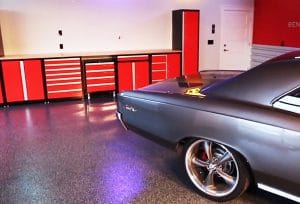
However, the actual tools, supplies, and techniques you need to use to properly clean your particular garage floor are liable to differ from those needed on a different garage floor. The material of your garage floor and the specific type of mess will determine how to clean your garage floor. In this article, we detail how to clean most of the more common types of garage floors as well as the most common types of messes.
Tools and Supplies
The tools and supplies necessary to clean a garage floor will differ depending on what kind of mess you are cleaning up and what your garage floor is made of. A concrete garage floor will generally require different cleaning agents than an epoxy garage floor for certain messes. That said, there are always a couple tools and supplies that will be necessary regardless of what kind of mess or floor you have.
The tools and supplies are as follows:
Something to soak up any liquid mess whether a fabric or particulate substrate.
This can be anything from cat litter to sawdust to even dirt. Granted, this may seem counterproductive as you will then have to clean up the substrate, but it is often necessary to get up stains and messes that have soaked into the material of your garage. This is especially relevant if your garage floor is made of a porous material that is not sealed. Be careful not to get a substrate that is too hard as this can end up scratching the finish to a sealed garage floor.
Something to break up any remaining residue or mess–this can include degreasers, astringents, and various other chemicals depending on the floor and the mess in question
This is easily the trickiest part about cleaning a garage floor as the flooring material may react negatively to some cleaning agents. Consumer-grade degreasers, like dish soap, are generally safe for all garage floors, but stronger cleaning agents, like TSP, are not. Make sure you know how the floor will react to a cleaning agent before using it, or you may very well have to redo the entire floor.
Something to scrub or buff the mess or mess once it has been soaked
Mops, dust mops, brooms, cloths, soft-bristle brushes, stiff-bristle brushes, electric buffer are all effective, but they are not all suitable for every kind of flooring material. Softer flooring materials or sealants will be prone to scratching and scuffing which limits the use of stiffer tools. On the flip side, more durable garage floor materials are less likely to respond as well to a tool that cannot get in deep and dig out residues and messes.
The issue is that some of the tools and supplies for one type of garage floor are liable to ruin a different type of garage floor.
On top of that, the supplies need to be chosen specifically for the type of mess that you are cleaning. Even though a number of cleaning agents seem similar and work on a number of the same messes, they might actually not be meant to clean certain messes. This is especially true of petroleum-based products and less so for messes composed of organic materials.
Keep reading to find out how to clean different types of garage floors as well as different types of messes.
How to Clean a…
How to clean a concrete garage floor
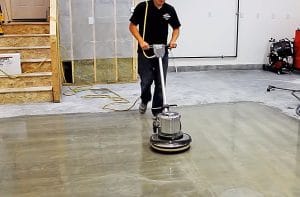
For general messes, you can choose common, household cleaners like baking soda, liquid soap, and warm water.
That said, the best way to clean a garage floor is to prevent it from getting messy in the first place by cleaning even the smallest mess right away. The longer you wait to clean a mess the more likely that mess will become more permanent and stain. Still, for a raw concrete garage floor, feel free to use as strong or weak of cleaning agents as you want, and have no fear using the stiffest-bristle of brushes.
Regardless, the process is the same as for most cleaning jobs. You will want to get up all the loose, dry debris that you can with a broom. Then, you will want to apply your cleaning agent and allow it to sit there for 5 to 15 minutes, depending on the mess, to break the mess up. If the mess is being stubborn, you may need to apply a stiffer-bristle brush and some elbow grease. Finally, rinse the mess and soak or mop up the remaining water. Of course, if you have a particular type of mess or your garage floor is not made of raw concrete, you will want to keep reading to find your particular problem’s solution below.
How to clean oil off a concrete garage floor
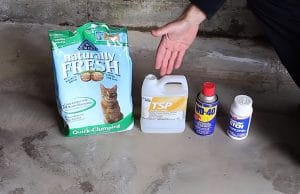
This first step when cleaning oil off of concrete is to soak it up as quickly as you can since the deeper it seeps the harder it will be to clean it up.
Make sure to apply pressure to the litter–stepping on it will work–to ensure that it gets into the smaller pores of the concrete and let it sit for 15 minutes. After sweeping up the saturated litter, you can then use any degreaser agent, including dish soap, and a stiff bristle brush. Of course, you will want to make sure that the degreaser is either appropriately concentrated, or you will have to repeat the process until the stain comes up.
How to clean an epoxy garage floor
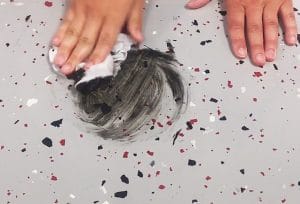
That said, the big differences between these different materials often does not come out as much during the cleaning process since they are all somewhat similar in chemical composition. Still, each particular material has its own unique exceptions that need to be addressed in order to prevent incompatibility. For instance, there are a number of cleaning agents that you can use on the resin of epoxies and similar materials.
However, one of the most common cleaning agents, rubbing, or isopropyl, alcohol is more effective at removing the epoxy altogether rather than cleaning the surface itself. Alternatively, a light application of mineral oils or acetone, like that used in most nail polish removers, is the best way to clean epoxy. That said, it is important to remember that baking soda or a steam cleaner is especially effective at cleaning up organic materials. Finally, when cleaning the floor, use a circular buffing technique, not a scrubbing one, to prevent scuffing and scarring.
How to clean the garage floor before painting
This may seem a bit tricky, but it is arguably the easiest type of garage floor cleaning we will cover. This is due to the fact that raw concrete is fairly durable to different cleaning techniques and mostly non-reactive with the most common cleaning agents. This means that you do not need to baby a raw concrete floor the way you might need to other materials. At the same token, cleaning a concrete floor before painting necessitates that the end result is cleaner than for other instances. This is because anything not cleaned off the concrete floor will sit between the floor and the paint, creating a future issue where the paint may separate from the floor or be more easily damaged.
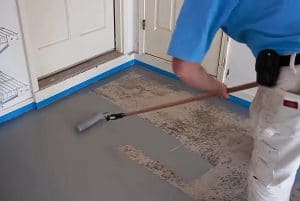
After this comes the tricky part where you will want to use a fairly strong chemical to scour the concrete of any remaining residues regardless of their makeup. In this case, one of the more popular solutions is an acid bath that uses a relatively high concentration of acid. While not strictly necessary, it is also a good idea to fill in any cracks and level the floor before painting to get a uniform and more durable finish.
How to clean a painted garage floor
Cleaning a painted garage floor may actually be one of the easiest instances of this task, though it still requires paying attention to the tools and supplies. In fact, painted garage floors are far more particular in this regard as numerous common cleaning agents can actually begin to break down the paint itself. On top of that, the tools used to then remove the stain can also degrade or otherwise damage the paint’s finish. For example, acetone is a great way to clean certain garage floors but will quickly ruin and dissolve paint. Likewise, the stiff-bristled brush that is so effective for concrete will summarily scratch the paint’s finish.
The biggest difference between cleaning a painted floor and most of the other types involves the brushing tool. In this case, you will want to use a mop that is made of soft fibers, so the paint does not get scuffed or scratched during the process. A mixture of water and any common soap-based cleaner will generally do the trick–though you may need to let the cleaner sit on the mess to fully break it down.
How to clean rust and oil stains
Though we already covered how to clean oil stains by themselves, when they are part of a stain mixed with oxidized metal, the process can get a bit trickier. This is because the mixture of metal and petroleum-based products creates a mess that behaves differently than either of the materials on their own. That said, the process for cleaning a rust and oil stain is fairly similar to the process of cleaning an oil stain on its own. The difference lies in what cleaning agents you need to use.
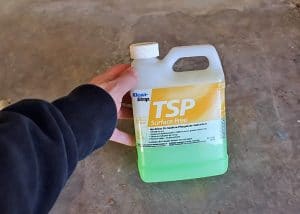
Of course, if you only have a rust stain without an oil stain, the process is much easier and can be accomplished without the use of harsh chemicals. On top of that, you will not need an absorbing substrate if you only have to clean a rust stain without a petroleum mess mixed in.
In fact, many of your standard “old wives’ tales” cleaners will work when cleaning a rust stain.
Rust removers almost without exception use some kind of acid to break down the oxidized metal. For your garage, we recommend either white vinegar with its acetic acid or some kind of citrus juice with its citric acid. Unless the flooring material will react with these weaker acids, we recommend using an undiluted form.
How to clean a rubber garage floor
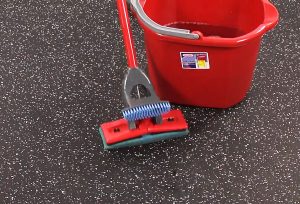
Despite how delicate rubber is compared to most of the other materials commonly used for garage floors, the cleaning process itself is fairly easy. The first thing to do is to clean up all of the loose, dry debris that you can and even going over the floor with a wet mop–without a cleaning agent at first. Once you are ready to tackle any stubborn messes, get a mixture of water with a weaker, diluted cleaning agent.
Liquid dish soap or white vinegar is especially effective without being too harsh.
Keep in mind that both strong acids–not like the diluted vinegar–as well as acetones can stain the rubber floor or even degrade it. Once you have let the cleaning solution sit on the difficult mess for 5 minutes, use a soft brush to break up the mess. Keep in mind that a soft nylon brush or even a sponge can be effective at this task while a stiff-bristle brush is liable to scratch or scar the rubber. Not only is this unsightly, but it will also actually make the rubber more porous which will decrease its lifespan further. In fact, even the mild abrasiveness of dirt and mud can slowly wear down and degrade rubber over time. Finally, always soak up or otherwise remove any liquid from the rubber when you are done as this can cause the material to rot while the liquid evaporates.
How to clean a tile garage floor
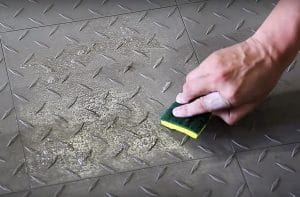
Unfortunately, this means that if your tile floor stains, then you are likely going to have to bleach it to get the stain out–whether with bleach or some other similar bleaching agent like hydrogen peroxide. That said, tile floors are fairly easy to clean if they have not been stained, starting with the dry clean. Once the dust is up, you will want to mix either baking soda and water or, for particularly tough messes, baking soda with liquid dish soap. Use a buffing motion to prevent causing abrasion damage, and use a soft chamois rather than a sponge.
How to clean a metal garage floor
This is easily one of the easiest types of garage floors to clean because metal is fairly unreactive with most of the chemicals used to clean a garage floor. Granted, some of the cleaning agents can eat away at the metal, but the smooth surface of metal generally prevents messes and stains from embedding below the surface. This means that you will likely not have to let the cleaning agent sit on the metal as long nor will you require as much scrubbing to clean it off. That said, if you scrub a metal garage floor with the wrong kind of stiff-bristle brush, you can actually scratch the metal itself. Of course, this generally applies more to softer metals and not the stainless steel or aluminum most often used.
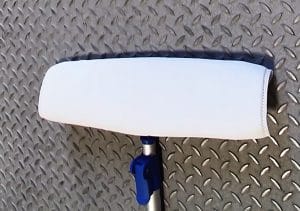
That said, a popular type of aluminum flooring, known as Diamond Plate Aluminum, is actually fairly sensitive. To be fair, the aluminum flooring is not what is sensitive but the special coating that this type of aluminum has is. This means that you should opt for a specialized aluminum cleaner for this type of garage flooring. On top of that, Diamond Plate Aluminum needs to be buffed when cleaned, not scrubbed. Scrubbing can wear away at the finish which makes the metal more susceptible to rust and corrosion.
How to clean organic waste
To be clear, “organic waste” is not really as neat of a category as we are making it out to be since certain organic wastes will require different cleaning procedures. That said, we are operating under the assumption that most organic wastes in a garage will be made of plant material. Whether you are a woodworker who needs to clean up sawdust or just a homeowner trying to get out grass stains after mowing the lawn, the same tools and supplies will generally be called for in either circumstance.
Thankfully, cleaning organic wastes is actually a fairly easy process and does not require any special supplies like some of the other types of messes.
The first thing that you will need to do is gather up all of the loose debris from the mess. For sawdust, this is likely to be the bulk of the mess itself, but grass will usually leave a stain as the chlorophyll bleeds onto the garage floor. In this instance, a simple mixture of cleaning soda and soap is sufficient for most organic wastes. You will want to let the cleaning solution sit on the stain for about 15 minutes before you either scrub or buff the garage floor, depending on what the floor is made of. You may need to repeat the process multiple times until all of the organic waste is broken down.
Conclusion
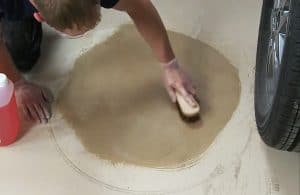
All garage floors will need to have the dry, loose debris cleaned up. All deeper messes will require the application of one cleaning agent or another. All stubborn messes will require the use of some kind of brush, rag, or other fibrous tools. Learn to keep these materials on hand. So long as you are aware of what your garage floor is susceptible to and what cleaning agents are needed for your particular mess, you should have no trouble getting your castle spic and span.
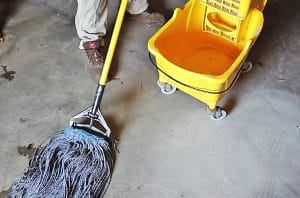
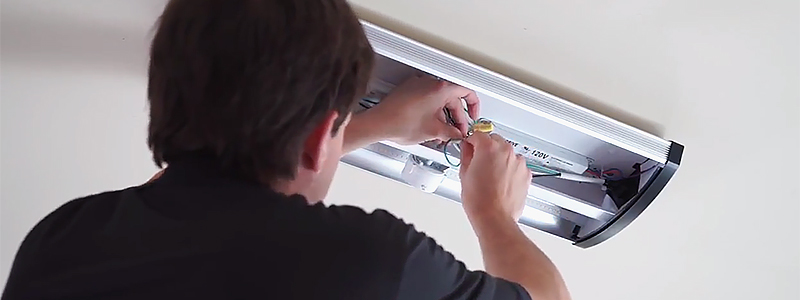

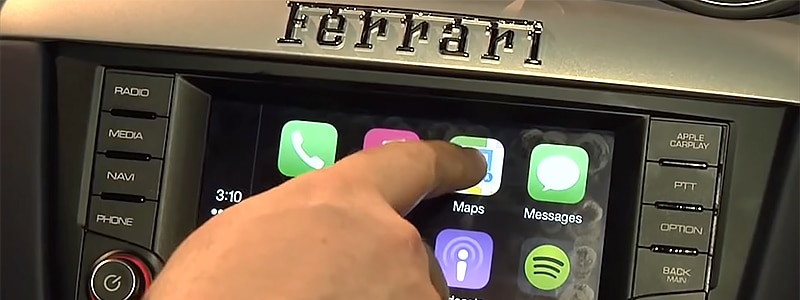
Leave a Reply